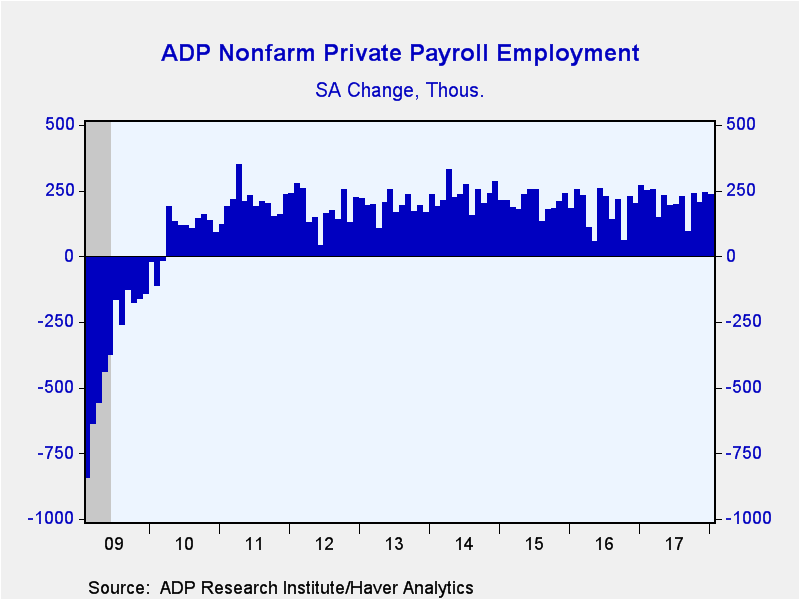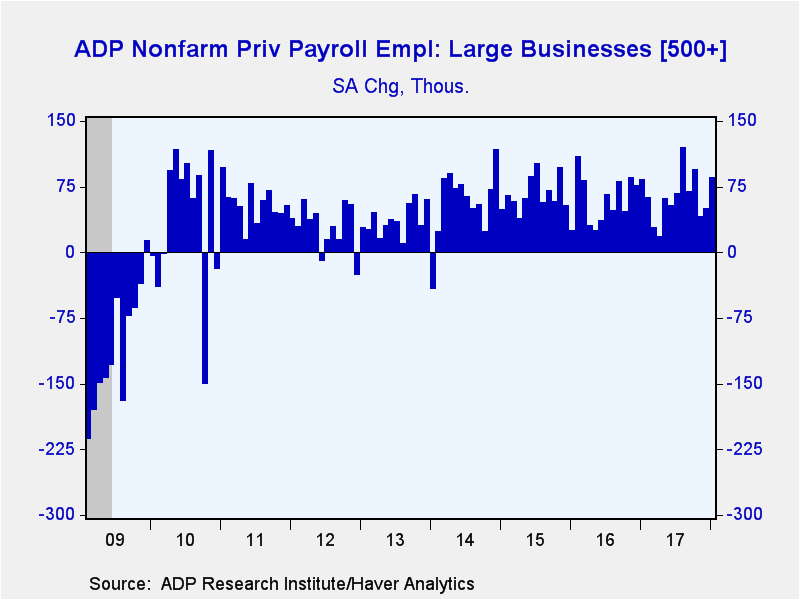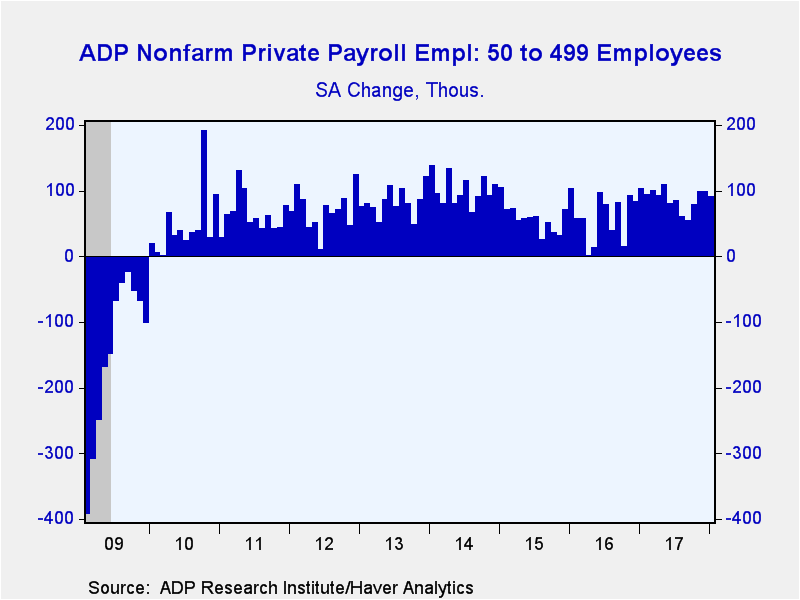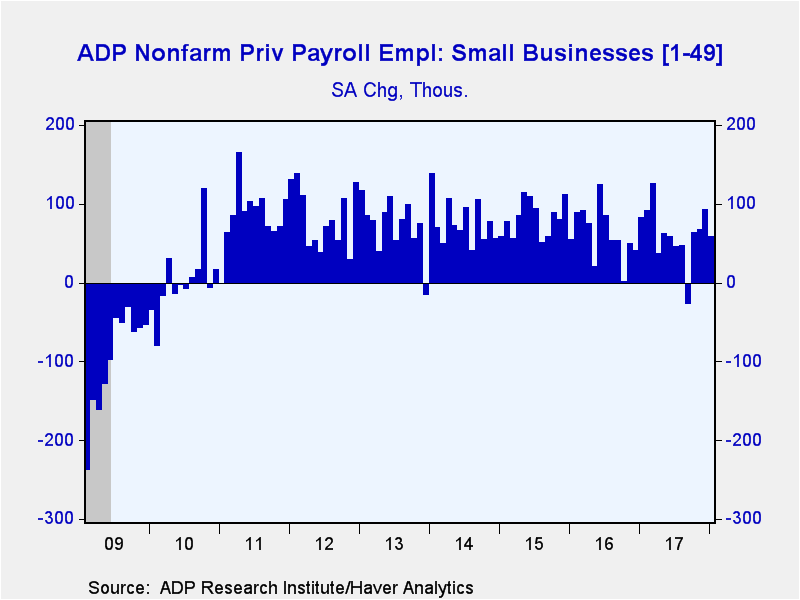 Global| Jan 31 2018
Global| Jan 31 2018U.S. ADP Private Payroll Growth Remains Firm
by:Tom Moeller
|in:Economy in Brief
Summary
The ADP/Moody's National Employment Report indicated that private nonfarm payrolls increased 234,000 (2.0% y/y) during January. The rise followed a downwardly revised 242,000 December gain and an upwardly revised 206,000 November [...]
The ADP/Moody's National Employment Report indicated that private nonfarm payrolls increased 234,000 (2.0% y/y) during January. The rise followed a downwardly revised 242,000 December gain and an upwardly revised 206,000 November increase. A 195,000 rise had been expected in the Action Economics Forecast Survey. During the last ten years, there has been a 96% correlation between the change in the ADP figure and the change in nonfarm private-sector payrolls as measured by the Bureau of Labor Statistics.
The Automatic Data Processing Research Institute survey is based on ADP's business payroll transaction system covering 411,000 companies and nearly 24 million employees. The data are processed by Moody's Analytics Inc., then calibrated and aligned with the BLS establishment survey data. The ADP data cover private sector employment only.
Small-sized business hiring in January increased 58,000 (1.4% y/y), the weakest increase since a decline in September. Medium-sized payrolls gained 91,000 (2.4% y/y), on a par with the last two months. Large-sized payrolls strengthened 85,000 (2.7% y/y), the largest gain in three months.
Private service-sector payrolls improved 212,000 (2.0% y/y), the strongest increase since November 2016. The number of trade, transportation and utilities jobs rose 51,000 (0.9% y/y), the largest increase since December 2016. Education & health services employment rose a strong 47,000 (2.0% y/y). Employment in the leisure & hospitality sector rose 46,000 (2.7% y/y), up from the gains during the prior three months. Professional & business services payrolls also improved 46,000 (3.4% y/y), but it was the smallest increase since December 2016. Financial activities jobs surged 16,000 (1.5% y/y), the strongest increase since last March. Employment in the information sector fell 3,000 (-1.5% y/y) where payrolls have been falling since early 2016.
Employment in the goods-producing sector rose 22,000 (2.5% y/y), the weakest increase since June and down from last year's 44,000 average. Construction sector payrolls increased 9,000 (3.7% y/y) after a 29,000 rise. Jobs in the factory sector rose 12,000 (1.6% y/y) compared to a 23,000 Q4 average. In the natural resource & mining sector, jobs rose 1,000 (5.2% y/y) after stability in December.
The ADP National Employment Report data are maintained in Haver's USECON database; historical figures date back to April 2001 for the total and industry breakdown, and back to January 2005 for the business size breakout. The expectation figure is available in Haver's AS1REPNA database.
Inequality and Recessions from the Federal Reserve Bank of Chicago can be found here.
| ADP/Moody's National Employment Report | Jan | Dec | Nov | Jan Y/Y | 2017 | 2016 | 2015 |
|---|---|---|---|---|---|---|---|
| Nonfarm Private Payroll Employment (m/m chg, 000s) | 234 | 242 | 206 | 2.0% | 2.0% | 1.9% | 2.3% |
| Small Payroll (1-49) | 58 | 93 | 67 | 1.4 | 1.4 | 1.9 | 1.9 |
| Medium Payroll (50-499) | 91 | 99 | 99 | 2.4 | 2.1 | 1.5 | 2.3 |
| Large Payroll (>500) | 85 | 50 | 41 | 2.7 | 2.7 | 2.8 | 3.0 |
| Goods-Producing | 22 | 49 | 38 | 2.5 | 1.9 | 0.8 | 2.0 |
| Construction | 9 | 30 | 8 | 3.7 | 3.6 | 4.1 | 5.2 |
| Manufacturing | 12 | 19 | 27 | 1.6 | 1.0 | 0.2 | 1.2 |
| Service-Producing | 212 | 193 | 168 | 2.0 | 2.0 | 2.2 | 2.3 |
Tom Moeller
AuthorMore in Author Profile »Prior to joining Haver Analytics in 2000, Mr. Moeller worked as the Economist at Chancellor Capital Management from 1985 to 1999. There, he developed comprehensive economic forecasts and interpreted economic data for equity and fixed income portfolio managers. Also at Chancellor, Mr. Moeller worked as an equity analyst and was responsible for researching and rating companies in the economically sensitive automobile and housing industries for investment in Chancellor’s equity portfolio. Prior to joining Chancellor, Mr. Moeller was an Economist at Citibank from 1979 to 1984. He also analyzed pricing behavior in the metals industry for the Council on Wage and Price Stability in Washington, D.C. In 1999, Mr. Moeller received the award for most accurate forecast from the Forecasters' Club of New York. From 1990 to 1992 he was President of the New York Association for Business Economists. Mr. Moeller earned an M.B.A. in Finance from Fordham University, where he graduated in 1987. He holds a Bachelor of Arts in Economics from George Washington University.
More Economy in Brief
 Global| Feb 05 2026
Global| Feb 05 2026Charts of the Week: Balanced Policy, Resilient Data and AI Narratives
by:Andrew Cates










